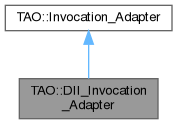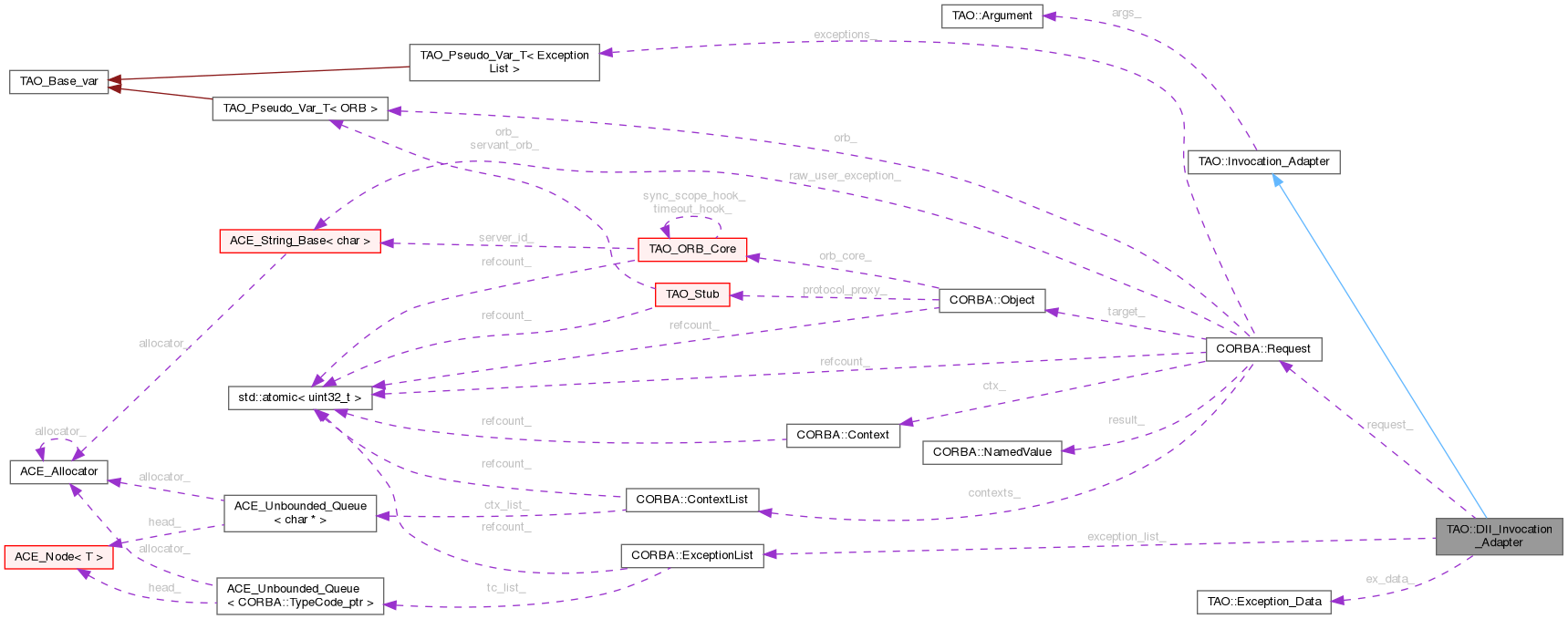Generic interface for the DII invocation object visible. More...
#include <DII_Invocation_Adapter.h>
Inheritance diagram for TAO::DII_Invocation_Adapter:

Collaboration diagram for TAO::DII_Invocation_Adapter:

Public Member Functions | |
| DII_Invocation_Adapter (CORBA::Object *target, Argument **args, int arg_number, const char *operation, size_t op_len, CORBA::ExceptionList *exception, CORBA::Request *r, Invocation_Mode mode=TAO_DII_INVOCATION) | |
| virtual | ~DII_Invocation_Adapter () |
| virtual void | invoke (const TAO::Exception_Data *ex, unsigned long ex_count) |
| Invoke the target. | |
 Public Member Functions inherited from TAO::Invocation_Adapter Public Member Functions inherited from TAO::Invocation_Adapter | |
| Invocation_Adapter (CORBA::Object_ptr target, Argument **args, int arg_number, const char *operation, size_t op_len, int collocation_opportunity, TAO::Invocation_Type type=TAO_TWOWAY_INVOCATION, TAO::Invocation_Mode mode=TAO_SYNCHRONOUS_INVOCATION, bool has_in_args=true) | |
| virtual | ~Invocation_Adapter () |
| void | _tao_byte_order (int byte_order) |
| int | _tao_byte_order () |
Protected Member Functions | |
| virtual Invocation_Status | invoke_twoway (TAO_Operation_Details &op, CORBA::Object_var &effective_target, Profile_Transport_Resolver &r, ACE_Time_Value *&max_wait_time, Invocation_Retry_State *retry_state=0) |
| virtual Invocation_Status | invoke_collocated_i (TAO_Stub *stub, TAO_Operation_Details &details, CORBA::Object_var &effective_target, Collocation_Strategy strat) |
 Protected Member Functions inherited from TAO::Invocation_Adapter Protected Member Functions inherited from TAO::Invocation_Adapter | |
| virtual void | invoke_i (TAO_Stub *stub, TAO_Operation_Details &details) |
| virtual Invocation_Status | invoke_remote_i (TAO_Stub *stub, TAO_Operation_Details &details, CORBA::Object_var &effective_target, ACE_Time_Value *&max_wait_time, Invocation_Retry_State *retry_state=0) |
| virtual Invocation_Status | invoke_oneway (TAO_Operation_Details &details, CORBA::Object_var &effective_target, Profile_Transport_Resolver &r, ACE_Time_Value *&max_wait_time) |
| bool | get_timeout (TAO_Stub *stub, ACE_Time_Value &val) |
| TAO_Stub * | get_stub () const |
| void | object_forwarded (CORBA::Object_var &effective_target, TAO_Stub *stub, CORBA::Boolean permanent_forward) |
| void | set_response_flags (TAO_Stub *stub, TAO_Operation_Details &details) |
Private Member Functions | |
| DII_Invocation_Adapter ()=delete | |
| DII_Invocation_Adapter (const DII_Invocation_Adapter &)=delete | |
| DII_Invocation_Adapter & | operator= (const DII_Invocation_Adapter &)=delete |
Private Attributes | |
| CORBA::ExceptionList * | exception_list_ |
| CORBA::Request * | request_ |
| TAO::Exception_Data * | ex_data_ |
Additional Inherited Members | |
 Protected Attributes inherited from TAO::Invocation_Adapter Protected Attributes inherited from TAO::Invocation_Adapter | |
| CORBA::Object_ptr | target_ |
| Argument **const | args_ |
| int const | number_args_ |
| bool | has_in_args_ |
| char const * | operation_ |
| size_t const | op_len_ |
| int const | collocation_opportunity_ |
| Invocation_Type const | type_ |
| Invocation_Mode const | mode_ |
| int | byte_order_ |
Detailed Description
Generic interface for the DII invocation object visible.
Constructor & Destructor Documentation
◆ DII_Invocation_Adapter() [1/3]
| TAO::DII_Invocation_Adapter::DII_Invocation_Adapter | ( | CORBA::Object * | target, |
| Argument ** | args, | ||
| int | arg_number, | ||
| const char * | operation, | ||
| size_t | op_len, | ||
| CORBA::ExceptionList * | exception, | ||
| CORBA::Request * | r, | ||
| Invocation_Mode | mode = TAO_DII_INVOCATION ) |
The only constructor used by the IDL compiler and only way to create this adapter.
- Parameters
-
target Points to the object on which this invocation is being invoked. args Array of pointers to the argument list in the operation declaration. this includes the return, inout and out arguments. arg_number Number of arguments in the above array. This is the number of elements in the above array. operation The name of the operation being invoked. op_len Number of characters in the operation name. This is an optimization which helps us to avoid calling strlen () while creating a message format. mode Invocation mode. This information is also available in the IDL file and in the generated code.
◆ ~DII_Invocation_Adapter()
|
virtual |
◆ DII_Invocation_Adapter() [2/3]
|
privatedelete |
◆ DII_Invocation_Adapter() [3/3]
|
privatedelete |
Member Function Documentation
◆ invoke()
|
virtual |
Invoke the target.
Reimplemented from TAO::Invocation_Adapter.
◆ invoke_collocated_i()
|
protectedvirtual |
Reimplemented from TAO::Invocation_Adapter.
◆ invoke_twoway()
|
protectedvirtual |
Reimplemented from TAO::Invocation_Adapter.
◆ operator=()
|
privatedelete |
Member Data Documentation
◆ ex_data_
|
private |
◆ exception_list_
|
private |
◆ request_
|
private |
The documentation for this class was generated from the following files: